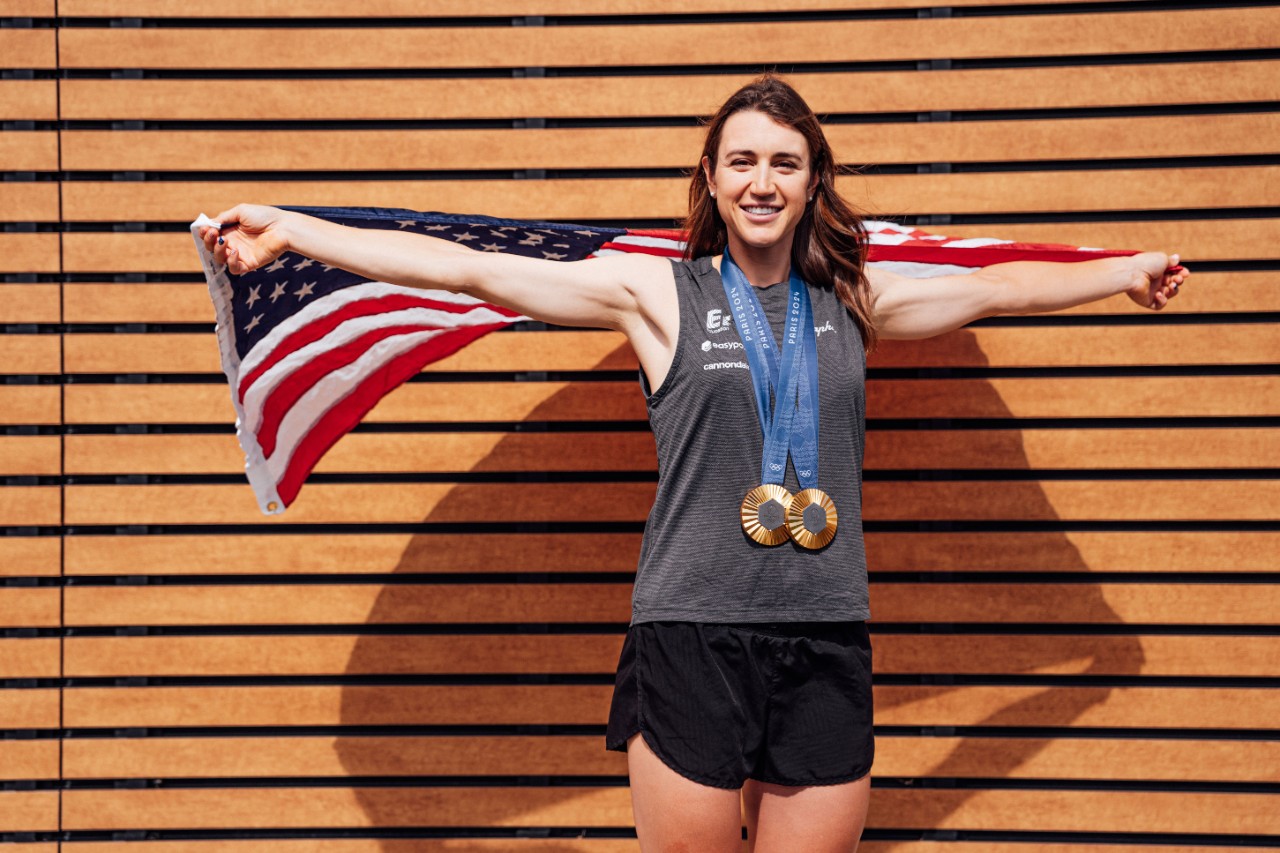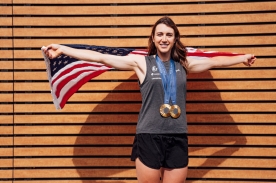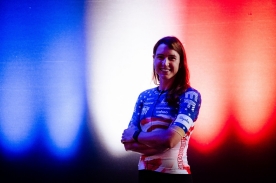Hi, Kristen. How are you doing?
I'm good, thanks. I’ve just arrived in Rotterdam. So, I went straight from USA House to EF House. It's been a pretty hectic few weeks. I feel like I haven't had the chance to celebrate or rest or anything. I feel like after the Tour de France I'll get that chance finally.
Firstly, congratulations on your double Olympic triumph. How did it feel? It’s the first time since LA 84 that an American woman has won the cycling road race. Has that sunk in yet?
To be honest, I wasn’t thinking about the history of women’s cycling in the U.S. when I crossed the finish line. I wasn't thinking about what had happened in the past. I was so focused on the here and now – ‘get to the finish line, do the best you can in race’. So, I think it was actually quite a bit after the race when someone told me [that she was the first American woman in 40 years to win the race]. For me the biggest thing is that, you know, cycling in the United States, especially for women, is not a very big sport, it's not a very popular sport. I think the most exciting opportunity is really just to raise awareness of the sport, get more girls on bikes, and I hope that this performance brings US cycling back on the map in a big way. You know, for me it's great to earn a gold medal, but it would be even greater if it had the impact of getting more girls on bikes.
You started cycling relatively late – it was in 2017 that you took your first ever cycling class. How do you go from being a novice, then six, seven years later, performing on the biggest stage in the sport? What were the key components to your success?
Well, I think the first thing is that I was ‘all in’, you know. I started racing and I was really dedicated. I would train anywhere from two hours a day minimum during the week and four hours on the weekends. Every single weekend, I was going away to races, I was going to bed early, I wasn't staying up late, going out and partying.
A lot of people see this kind of Cinderella story of what happened, but they don't realize a lot of the challenges and roadblocks and sacrifices that went along with it, you know. I left my job and moved to Europe. When I did that, I had no idea what to expect – I didn't know anyone in Europe, and none of my friends or family really knew what I was doing. [Laughs]
It was never a Cinderella story until it worked out. Like, I sacrificed a lot of other things in my life to make it happen.
The second thing is that I was really open to learning constantly – I was always studying races, I would review races after every race I did and analyze it, watch how I did, watch what the leaders did, I would talk about races with my directors and my coaches. I was always trying to figure out how can I get from where I am now to, to the next level up and I had to take a lot of feedback. I did a lot of things wrong, but I've always been willing to learn and listen and work hard, and I think that made the biggest difference.
You studied computer science at Harvard, then went into venture capitalism, and now you’re a professional cyclist…that’s a pretty huge career shift. Do you think there was anything in your education and in your work that you've transferred over into your cycling?
Yeah, absolutely. Computer science at Harvard was an engineering course and it was really difficult. I had to be super focused. There were many nights – you know, Friday nights – where I was working on p-sets and my friends were out partying…so I think the sacrifice and the dedication, the early bedtimes, and really just having to put my head down and do work is something that was comfortable to me. I also think being a college athlete [Kristen was a rower at Harvard], having to balance school and sports was similar to when I started cycling and I had to wake up at 5 a.m. to go train before work. You know, it was an extension of what I had done in college.
I think in terms of like actual learning, you know, venture capitalism is actually very similar to cycling in some ways – you're always evaluating risks, you're trying to figure out if it's worth being patient or being aggressive. But when you do decide to make a decision, you go all in. You know, you don't look back, you don't hesitate, you don't doubt yourself, and you commit.
Your average pace during the final of the road race was a, frankly staggering, 25 miles per hour. What keeps your mind focused when you're on the saddle and you're exerting so much energy? Are you thinking being in the zone, or are you trying to motivate yourself?
There’s just so much thought process going on in the bike race. You know, I’m thinking about who the people are around me? Who are the leaders? Who's in shape right now? Who has teammates? Who doesn't have teammates? Who's a sprinter? Who would go with me if I attacked? Who wants us to come down to a brunch sprint? Who wants it to fall apart? How do I win from this group of people? So, for me, when I was in the bigger group, I went really hard up the cobble climb because I wanted to cut the group in half. I needed to make sure that if I attacked later on, there wouldn't be 10 people chasing me.
I've often talked about the ‘daydream sandwich’ during a race. You have this big goal, this big dream that you think about. It motivates you and inspires you to take a certain path. And then you just focus on the work, you know – that’s the middle part of sandwich – it’s all process, control what you can control. Put your head down, do the work. And then at the very end when it's like really, really hard, you're in the dumps, you know, and you're like is this worth it? You know, that moment is when you think again of the prize, the goal. And so,
you know, in the final kilometers or something, if you need some inspiration, you can, you can think like, this is why I'm doing it.






